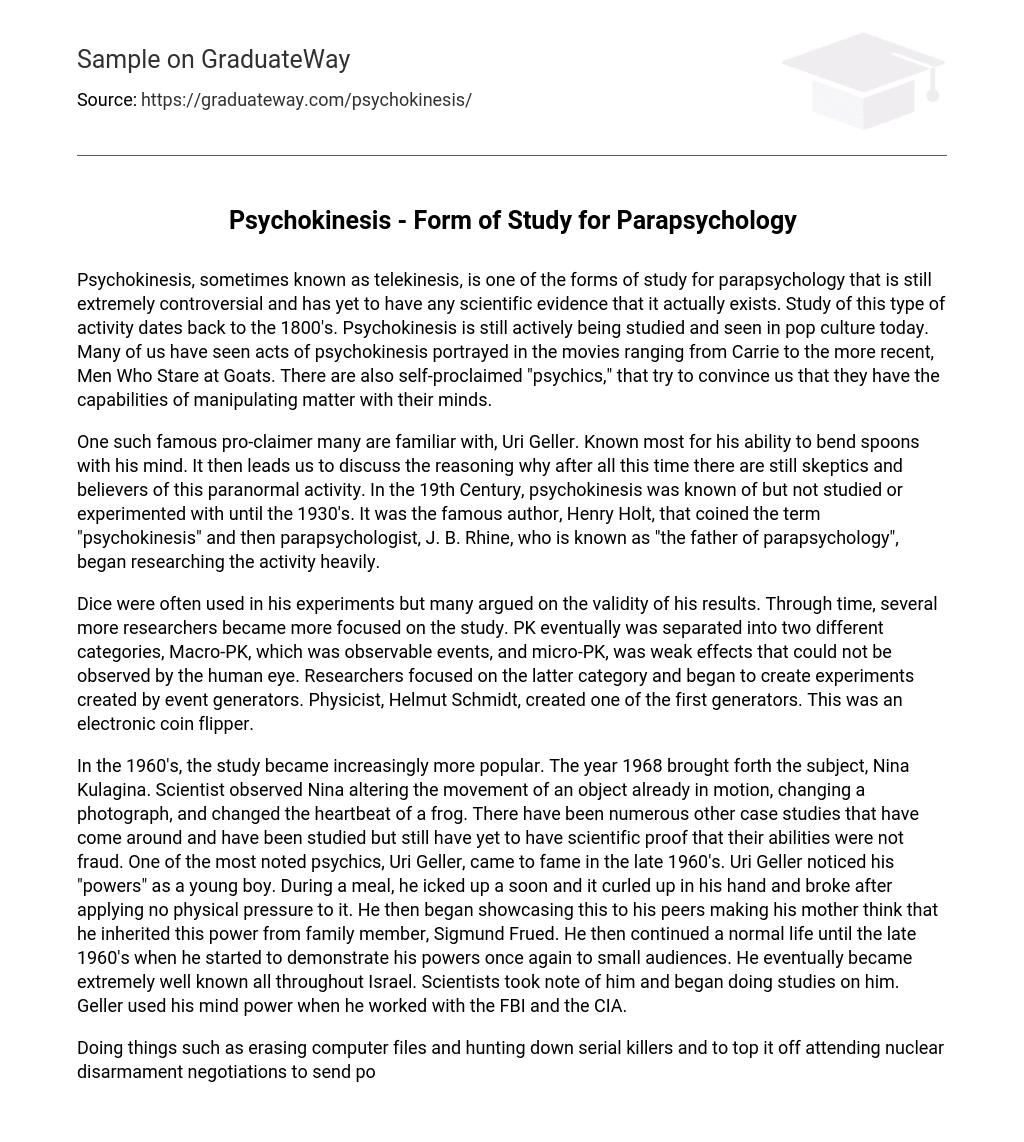Psychokinesis, sometimes known as telekinesis, is one of the forms of study for parapsychology that is still extremely controversial and has yet to have any scientific evidence that it actually exists. Study of this type of activity dates back to the 1800’s. Psychokinesis is still actively being studied and seen in pop culture today. Many of us have seen acts of psychokinesis portrayed in the movies ranging from Carrie to the more recent, Men Who Stare at Goats. There are also self-proclaimed “psychics,” that try to convince us that they have the capabilities of manipulating matter with their minds.
One such famous pro-claimer many are familiar with, Uri Geller. Known most for his ability to bend spoons with his mind. It then leads us to discuss the reasoning why after all this time there are still skeptics and believers of this paranormal activity. In the 19th Century, psychokinesis was known of but not studied or experimented with until the 1930’s. It was the famous author, Henry Holt, that coined the term “psychokinesis” and then parapsychologist, J. B. Rhine, who is known as “the father of parapsychology”, began researching the activity heavily.
Dice were often used in his experiments but many argued on the validity of his results. Through time, several more researchers became more focused on the study. PK eventually was separated into two different categories, Macro-PK, which was observable events, and micro-PK, was weak effects that could not be observed by the human eye. Researchers focused on the latter category and began to create experiments created by event generators. Physicist, Helmut Schmidt, created one of the first generators. This was an electronic coin flipper.
In the 1960’s, the study became increasingly more popular. The year 1968 brought forth the subject, Nina Kulagina. Scientist observed Nina altering the movement of an object already in motion, changing a photograph, and changed the heartbeat of a frog. There have been numerous other case studies that have come around and have been studied but still have yet to have scientific proof that their abilities were not fraud. One of the most noted psychics, Uri Geller, came to fame in the late 1960’s. Uri Geller noticed his “powers” as a young boy. During a meal, he icked up a soon and it curled up in his hand and broke after applying no physical pressure to it. He then began showcasing this to his peers making his mother think that he inherited this power from family member, Sigmund Frued. He then continued a normal life until the late 1960’s when he started to demonstrate his powers once again to small audiences. He eventually became extremely well known all throughout Israel. Scientists took note of him and began doing studies on him. Geller used his mind power when he worked with the FBI and the CIA.
Doing things such as erasing computer files and hunting down serial killers and to top it off attending nuclear disarmament negotiations to send positive brain waves to the chief negotiator. This part of his career path was extremely controversial and confidential to discuss with the public. Geller became more mainstream and started doing more performances to the public in the 70’s. Most of these demonstrations were performed in an uncontrolled environment. Skeptics included psychologists, Dr. David Marks and Dr. Richard Kammann.
They published descriptions of how Gellar cheated by peering through a hole in the laboratory where the testing was taking place. Gellar also had access to a two-way intercom that enabled him to listen to the investigator’s conversation. Believers of his practice include magicians of the Society of American Magicians. In 1974, they tested Uri Gellar and came up with positive test results. With their expertise they concluded that his performances were free of fraud. It is clear that not only in Gellars case that there are still skeptics and believers of psychokinesis.
Previous research has suggested that people who believe that psychokinesis exists do so because of a personality disorder, impaired judgement,and numerous other deficits. Scientist say that believers have an extreme misunderstanding of chance and coincidence. Psychological reasons can explain why people will believe in PK as well. Most people will tend to trust their own perceptions more than scientific evidence. Basically, our own perceptions seem more real to us than actual scientific data.
Social skills are another factor in which skeptics fell believers are in the wrong. People pick up nonverbal cues from another person guessing what is on their minds because of cues and knowledge of the individual. Believing in psychokinesis will sometimes fill a personal need for an individual. It offers them a sense of control. More recently, a survey regarding PK polled whether Americans believed in it or not. Of the 1,721 participants 28% of males and 31% of females confirmed that they “agreed” or “strongly agreed” with the existence of PK.
British psychologist, Richard Wiseman, conducted an online survey where he polled over 400 hundred magicians worldwide. Surprisingly, 83. 5% said that they did not believe that PK exists and the small amount of 9% did believe. At this point in time, believers will keep on believing and skeptics will continue to question the authenticity of this practice. Even with its strong presence in history and constant studies and experiments to date, we have still yet to determine if PK actually exists.
Pop culture, magicians, and psychics will continue to attempt in making us believe that the practice is real. Until there is proof in a controlled environment, the skeptics will not believe what is being performed to them. Believers will continue to support what they see in front of them. There even is a one million dollar reward offered by The James Randi Educational Foundation that will be given to anyone who can produce a psychokinetic act in a controlled, mutually agreed upon experiment. Until we have scientific evidence, existence of psychokinesis will be heavily debated.





